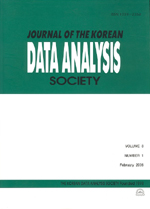대사증후군 위험 사무직 근로자를 위한 생활습관개선 코칭프로그램의 효과
A Study on Lifestyle Improvement Coaching Program for Office Employees at Risk of Metabolic Syndrome
- 한국자료분석학회
- Journal of The Korean Data Analysis Society (JKDAS)
- Vol.23 No.5
-
2021.102331 - 2349 (19 pages)
-
DOI : 10.37727/jkdas.2021.23.5.2331
- 165

본 연구는 대사증후군 위험 사무직 근로자를 위한 생활습관개선 코칭프로그램이 이들의 생활습관개선 자기효능감, 생활습관개선 행동 및 대사증후군 지표에 미치는 효과를 제시하고자 시도되었다. 자료수집 기간은 2017년 1월 23일∼3월 31일까지였고, 연구대상자는 대사증후군 위험 사무직 근로자 55명이었으며 실험군 28명, 대조군 27명이었다. 실험군에게는 2017년 1월 23일∼3월 3일까지 6주간 주 2회, 1회당 90분, 총 12회 차의 그룹코칭과 매일 60분의 인터넷 코칭을 적용하였고, 대조군에게는 생활습관개선에 관한 일회성 교육을 제공하였다. 자료분석은 SPSS 23.0 프로그램을 이용하여, 정규성 검정은 Shapiro-Wilk, 동질성 검정은 Chi-square test, Fisher s exact test, independent t-test, Mann-Whitney U test로 분석하였으며, 가설검정은 Repeated measures ANOVA와 Friedman test로 분석하였다. 생활습관개선 코칭프로그램을 적용하여 효과를 검정한 결과 실험군은 대조군보다 생활습관개선 자기효능감과 생활습관개선 행동이 유의하게 증가하였고, 대사증후군 지표 중 복부둘레, 공복혈당, 중성지방, 및 HDL-C이 유의하게 향상되었다. 따라서 본 연구에서 적용한 생활습관개선 코칭프로그램은 대사증후군 위험 사무직 근로자가 스스로 건강행위를 지속할 수 있도록 하는 효과적인 간호중재로 사용될 수 있을 것이며, 나아가 만성질환으로 이행되는 것에 대한 예방 전략으로 활용할 수 있을 것이다.
Purpose: This study was conducted to examine the effects of lifestyle improvement coaching program for office employees at risk of metabolic syndrome on their lifestyle improving self-efficacy, behavior and metabolic syndrome indices. Method: The experimental group was given a 90-minute group coaching twice a week for 6 weeks from January 23 to March 3, 2017 for total 12 sessions along with a 60-minute internet coaching everyday, and the control group was given a one-time education on lifestyle improvement. Results: The experimental group showed significant improvement in lifestyle improvement self-efficacy and lifestyle improvement behavior compared to the control group, and the abdominal circumference, fasting blood sugar, neutral fat and HDL-C among metabolic syndrome indices were significantly improved. Conclusion: The lifestyle improvement coaching program applied in this study may be used as an efficient nursing intervention that encourages office employees at risk of metabolic syndrome to continuously maintain their own health behaviors.
1. 서론
2. 연구방법
3. 연구결과
4. 논의
5. 결론 및 제언
References
(0)
(0)